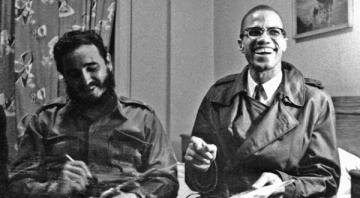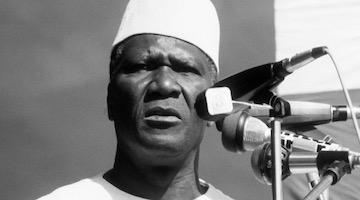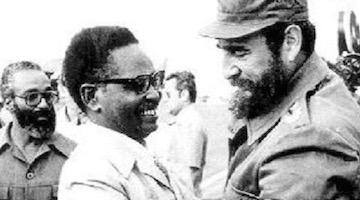When fascism was on the march Black women intellectuals and activists imagined, and struggled for, a new world.
“Black women are political protagonists, not secondary characters in global movements.”
In this series, we ask acclaimed authors to answer five questions about their book. This week’s featured author is Annette Joseph-Gabriel. Dr. Joseph-Gabriel is an Assistant Professor of French and Francophone Studies at the University of Michigan, Ann Arbor. Her book is Reimagining Liberation: How Black Women Transformed Citizenship in the French Empire.
Roberto Sirvent: How can your book help BAR readers understand the current political and social climate?
Annette Joseph-Gabriel: The results of recent elections in Europe, the United States, Brazil and elsewhere have led to a renewed interest in better understanding fascism. What is fascism? How does one recognize its contemporary manifestations? Perhaps most importantly, how do we combat it effectively? These questions are now central to presidential campaigns, grassroots organizing, and social media debates. Because my book is set during and immediately after World War II, it can help readers to understand how Black women answered then the same questions we are asking now. Women like Suzanne Césaire, Paulette Nardal, and Eslanda Robeson wrote a lot about working toward peace after that horrific moment when Nazism looked poised to take over the world. But the global peace building project they imagined was also decidedly anti-imperialist and I think my book’s focus on their refusal of empire is critical for helping us today to imagine more just and livable worlds in the face of fascism than the compromises that we are asked to make in the name of civility.
What do you hope activists and community organizers will take away from reading your book?
In the book’s conclusion I talk about ruptures and continuities. I look at what threads of activism and political thought from that generation of women continued to run through the texts of women writing later in the 1970s and 80s. I also look at the threads that were broken, the gaps and silences around what was not or could not be spoken at the time. I hope that activists and community organizers will take away first and foremost some of the strategies by which the women in this book refused the everyday violence of oppression. Aoua Kéita, for example, was a midwife and community organizer whose autobiography highlights some of the really important ways that women in rural communities in Mali contributed to anticolonial politics. Those strategies can serve as a blueprint to be adapted for contemporary struggles for justice and equality for women who continue to be disenfranchised by the colonial political models that we have inherited in Africa and the Caribbean. I also hope that activists and community organizers today will see the gaps and silences in these women’s work as spaces for their own intervention, ways to push past the limits of respectability, of assimilation, and of acquiescing to capitalism’s dominance. I don’t know that any of the women in my book had the answer to how to do all of this at once, but bringing all their stories together is certainly a valuable starting point for seeing their range of visions for liberation as well as the common elements they shared, the elements on which we cannot compromise.
We know readers will learn a lot from your book, but what do you hope readers will un-learn? In other words, is there a particular ideology you’re hoping to dismantle?
I had to un-learn two things as I was writing the book and I hope that I am able to transmit that un-learning to any reader who is where I was when I started this work. First, Black women are political protagonists, not secondary characters in global movements. I always credit Keisha-Khan Perry with the term political protagonist and its application to Black women. There are copious writings by Black women that we can engage with seriously and honestly, neither ignoring their thought nor co-opting it without due acknowledgement. The second thing I had to un-learn was this: You do not need to be writing about gender to engage with Black women’s thought. Certainly, it is crucial for any informed analytical work to engage with the ways that different forms of oppression are gendered, and to account for that gendering in visions of liberation. But even if one’s work is framed differently, eliding Black women will always impoverish that work. For example, W.E.B. DuBois, Aimé Césaire and others did not write into a world only inhabited by men, even when they themselves could not see that. I read recent books that are framed as an analysis of Aimé’s political thought or poetry, for example, and I wonder how much more precise that analysis would be if it considered Suzanne Césaire’s close reading of Notebook of a Return to the Native Land or better still, if it accounted for the conversation between Aimé’s and Suzanne’s writings. Black women’s writings stand on their own and they are in conversation. But above all, they imagine new worlds and we continue to do ourselves a disservice when we discount them.
Who are the intellectual heroes that inspire your work?
This is a difficult question. There are far too many to name here. I am inspired by Suzanne Césaire’s lucidity and Eslanda Robeson’s incisive wit and ability to throw shade immediately and with precision. Robeson once responded to Lothrop Stoddard’s white supremacist text that lamented “the rising tide of color” by telling white supremacists that the tide was indeed rising and that they should “just jump in and learn to swim.” I wish I had her dexterity in dismissing the mediocrity of white supremacist ideas all while seriously working to dismantle their pernicious roots. I also try to emulate the intellectual generosity of scholars who have put in the work and continue to do so across different intellectual and activist communities, particularly Akosua Adomako Ampofo, Régine Jean-Charles, Renée Larrier, Irène d’Almeida and others. As a literary scholar, I learn so much from the beautiful and elegant close readings of Petal Samuel, Kathleen DeGuzman, Jennifer Wilks…there really are too many to name.
In what way does your book help us imagine new worlds?
At the end of her first essay for the journal Tropiques, Suzanne Césaire writes, “It is now urgent to dare to know oneself, to dare to admit to oneself what one is, to dare to ask oneself what one wants to be.” My book certainly doesn’t claim to provide answers to these existential questions, but what strikes me about Césaire’s words is the urgency she expresses. Whatever new worlds the women in the book imagined, they imagined them to be urgent, to be needed now in the face of virulent racism. My book is about the past, but the decolonized world it asks us to imagine has to be now.
Roberto Sirvent is Professor of Political and Social Ethics at Hope International University in Fullerton, CA. He also serves as the Outreach and Mentoring Coordinator for the Political Theology Network. He is co-author, with fellow BAR contributor Danny Haiphong, of the new book, American Exceptionalism and American Innocence: A People’s History of Fake News—From the Revolutionary War to the War on Terror.
COMMENTS?
Please join the conversation on Black Agenda Report's Facebook page at http://facebook.com/blackagendareport
Or, you can comment by emailing us at comments@blackagendareport.com














